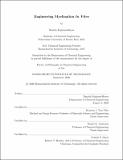Engineering myelination in vitro
Author(s)
Espinosa-Hoyos, Daniela.
Download1227513784-MIT.pdf (29.30Mb)
Other Contributors
Massachusetts Institute of Technology. Department of Chemical Engineering.
Advisor
Krystyn J. Van Vliet and Daniel G. Anderson.
Terms of use
Metadata
Show full item recordAbstract
The brain is the powerhouse of the central nervous system (CNS). When this system is out of balance, the implications are massive: neurological diseases are the leading cause of disability and number two leading cause of fatalities in the world. Returning the system to its steady state parallels in complexity. Despite the challenges in drug discovery and development for CNS disorders that have contributed to the shut-down of entire neuroscience programs in the pharmaceutical industry, the massive unmet need continues to motivate basic research and innovation in this space: there are no cures for CNS disorders. Myelin and oligodendroglia--the myelinating cells of the CNS--play central roles in homeostasis, and the pathogenesis of a myriad of neurological disorders, including multiple sclerosis. Academic and industrial researchers need new tools, which include new materials and procedures, to develop new strategies for myelin and oligodendroglial protection and repair. This thesis leverages interdisciplinary technologies and concepts to address challenges and inefficiencies in the current approach to discover and develop therapies for myelin disorders. We sought to address the need for preclinical in vitro tools compatible with high content screening that can replicate key aspects of myelination and the oligodendroglial niche. Inspired by physical and mechanical properties of neuronal axons, we developed new compliant and biocompatible polymers and additive manufacturing methodology to create Artificial Axons. We established primary rat myelination assays and showed that Artificial Axons capture key properties of oligodendroglial and neuronal interactions, which can be imaged in real time, and quantified. We implemented induced pluripotent stem cell technology to demonstrate that some but not all aspects of oligodendrocyte mechanotransduction are conserved across rats and humans in vitro, further motivating the use of human cells for the study of uniquely human diseases. We also demonstrated the first quantitative axon-free human myelination assays, and explored their use in drug discovery, including for dose response and small molecule screening. Finally, we discuss the modification of these assays and manufacturing methodologies, including harnessing material properties, to scale up the fabrication of Artificial Axons with better spatial resolution for high content screening.
Description
Thesis: Ph. D., Massachusetts Institute of Technology, Department of Chemical Engineering, September, 2020 Cataloged from student-submitted PDF of thesis. Includes bibliographical references.
Date issued
2020Department
Massachusetts Institute of Technology. Department of Chemical EngineeringPublisher
Massachusetts Institute of Technology
Keywords
Chemical Engineering.